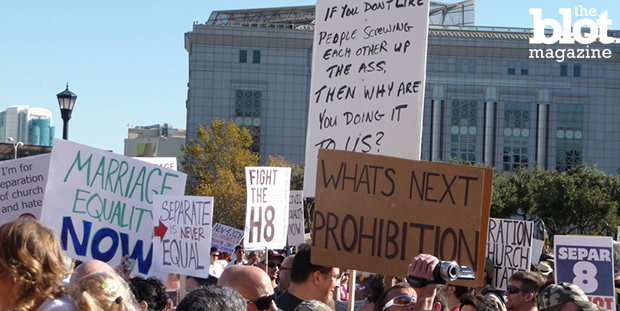
A woman’s quest to have homosexuality legally defined as a “sin” has been rejected by a federal court in Nebraska. The gays have fought back.
In an order dismissing 66-year-old Sylvia Driskell’s civil lawsuit, federal judge John Gerrard found that the Auburn resident’s suggestion that homosexuality was against the teachings of God was not something the court could decide one way or another.
“The court may decide what is lawful, not what is sinful,” Gerrard wrote in his three-page order released on Wednesday. The judge said Driskell failed to comply with the court’s rules for pleading, including setting forth a demand for relief.
Driskell, who called herself an ambassador to God and Jesus Christ, filed a neatly handwritten seven-page application with the court last month. In it, Driskell sought to sue the entire gay population worldwide for committing what she claimed was a sin in defiance of the teachings of God. In her pleading, she cited several Biblical passages to support her arguments, many of which seemed to be largely in opposition to gay marriage.
“Never before has our great nation, the United States of America, and our great state of Nebraska been besieged by sin,” Driskell wrote. “I’m sixty-six years old, and I never thought that I would see the day in which our great nation and our great state of Nebraska would become so compliant to the complicity of some peoples [sic] lewd behavior.”
“Why are judges passing laws, so sinners can break religious and moral laws?” Driskell writes in her petition. “Will all the judges of this nation judge God to be a lier [sic]?”
Read more: Nebraska Woman Sues All Homosexuals on Behalf of God and Jesus
Gerrard wrote in his order that it was not up to the courts to decide whether living a homosexual lifestyle was a sin.
“A federal court is not a forum for debate or discourse on theological matters,” Gerrard wrote. “Other forums, freely accessible to citizens of the United States, exist for the purpose of addressing questions of religious doctrine.”
Even if the court had standing for her claim, Gerrard wrote that Driskell failed to claim “a particular injury” inflicted against her by gays around the world. Gerrard also found that Driskell’s suing of the world’s entire homosexual population created a problem in that the court would not be able to identify specific individuals for the purpose of serving her lawsuit.
Gerrard said he would not give Driskell the opportunity to amend her lawsuit because “it is obvious that amendment would be futile.”
Nebraska is one of a handful of states that does not currently recognize same-sex marriage. In 2000, voters approved a ballot initiative that banned gays and lesbian couples from marrying in the state; the ban was overturned earlier this year, but an appellate court stayed the order, effectively keeping Nebraska’s ban in place.
That ban could be lifted in June when the Supreme Court is expected to rule as to whether or not states can legally block same-sex marriage. The decision will likely impact similar bans in nearly a dozen other states across the country.





